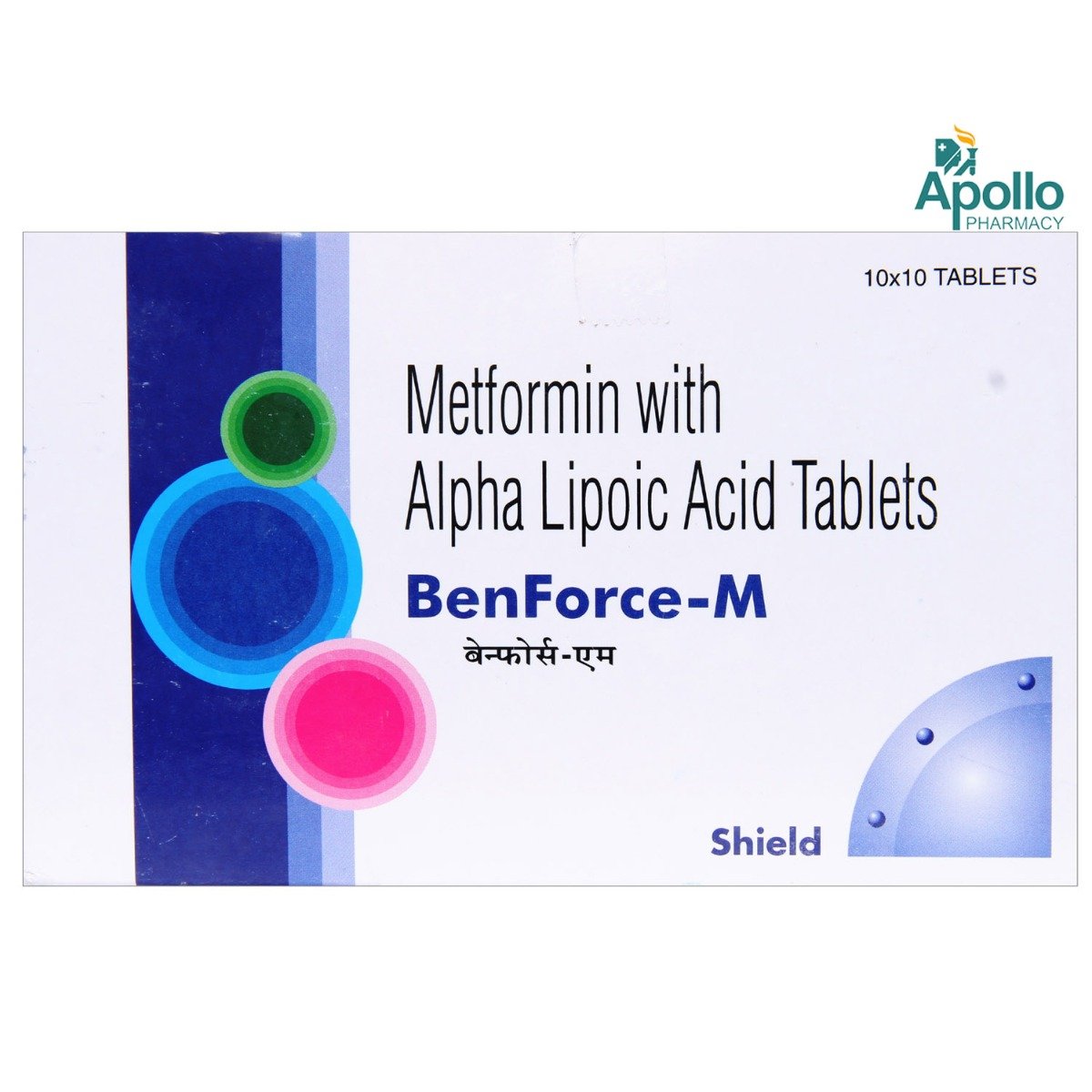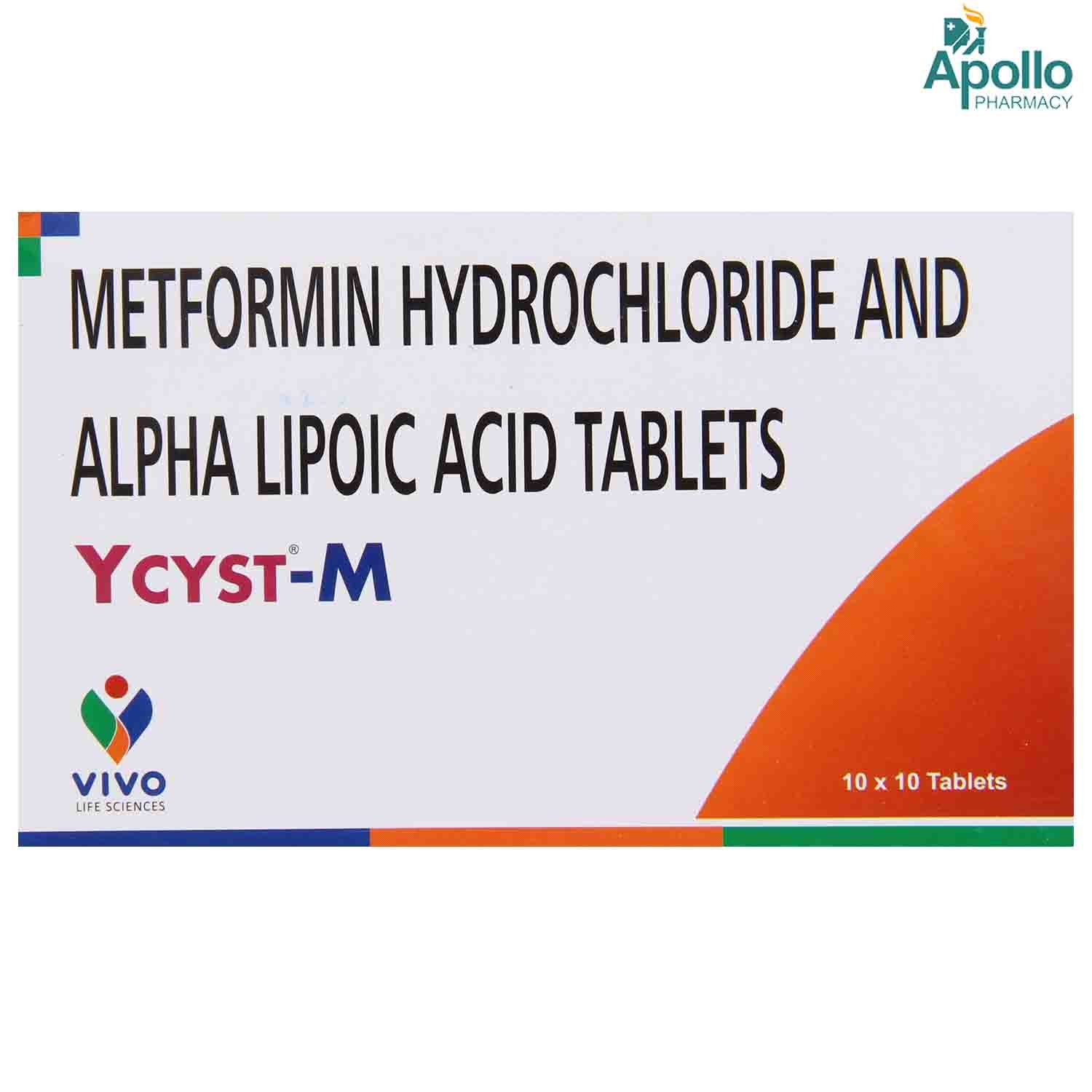Metmin-A Tablet 10's
MRP ₹62.5
(Inclusive of all Taxes)
₹9.4 Cashback (15%)
Provide Delivery Location

secured payment

india's most trusted pharmacy

genuine products
Manufacturer/Marketer :
Consume Type :
Expires on or after :
Return Policy :
About Metmin-A Tablet
Metmin-A Tablet is a combination medication primarily used to restore normal menstrual function and reduce cyst formation in PCOS patients. A fluid-filled sac that develops on an ovary is known as an ovarian cyst. They're very common and usually don't cause any symptoms. Ovarian cysts can affect both ovaries at the same time or only one.
Metmin-A Tablet combines two medications: metformin (antidiabetic) and alpha-lipoic acid. Metmin-A Tablet improves insulin sensitivity and ovarian angiogenesis to restore normal menstrual function and prevent cyst development in PCOS patients (blood vessel formation).
Metmin-A Tablet should take it regularly at evenly spaced intervals per your doctor's prescribed schedule. Taking it at the same time every day will help you remember to take it. The dose and duration of treatment will depend on the severity of your condition. Take it for as long as the doctor has prescribed for maximum benefits. In some cases, Metmin-A Tablet can cause side effects like feeling sick (nausea), sick (vomiting) or diarrhoea, stomach ache, loss of appetite, and a metallic taste in the mouth. These side effects are not familiar to everyone and vary individually. If you notice any side effects that are not manageable, please consult your doctor.
Inform your doctor if you have had an allergic reaction to Metmin-A Tablet or any ingredients. Keep your doctor informed about your health condition and all the medicines you take before taking Metmin-A Tablet to rule out any side effects. Do not take Metmin-A Tablet if you are pregnant or breastfeeding unless prescribed. And There is limited information available on the use of Metmin-A Tablet in patients with liver/kidney disease. Please consult your doctor. Your doctor will prescribe only if the benefits outweigh the risks. It is not known whether Metmin-A Tablet alters the ability to drive. Do not drive or operate machinery if you experience symptoms affecting your ability to concentrate and react. Seek medical attention if the symptoms persist longer.
Uses of Metmin-A Tablet

Have a query?
Directions for Use
Key Benefits
Metmin-A Tablet combines two medications: metformin (antidiabetic) and alpha-lipoic acid. Metmin-A Tablet improves insulin sensitivity and ovarian angiogenesis (blood vessel formation) to restore normal menstrual function and prevent cyst development in PCOS patients.
Storage
- Inform Your Doctor: Notify your doctor immediately about your diarrhoea symptoms. This allows them to adjust your medication or provide guidance on managing side effects.
- Stay Hydrated: Drink plenty of fluids to replace lost water and electrolytes. Choose water, clear broth, and electrolyte-rich drinks. Avoid carbonated or caffeinated beverages to effectively rehydrate your body.
- Follow a Bland Diet: Eat easy-to-digest foods to help firm up your stool and settle your stomach. Try incorporating bananas, rice, applesauce, toast, plain crackers, and boiled vegetables into your diet.
- Avoid Trigger Foods: Steer clear of foods that can worsen diarrhoea, such as spicy, fatty, or greasy foods, high-fibre foods, and dairy products (especially if you're lactose intolerant).
- Practice Good Hygiene: Maintain good hygiene to prevent the spread of infection. To stay healthy, wash your hands frequently, clean and disinfect surfaces regularly, and avoid exchanging personal belongings with others.
- Take Anti-Diarrheal Medications: If your doctor advises, anti-diarrheal medications such as loperamide might help manage diarrhoea symptoms. Always follow your doctor's directions.
- Keep track of your diarrhoea symptoms. If they don't get better or worse or are accompanied by severe stomach pain, blood, or dehydration signs (like extreme thirst or dark urine), seek medical help.
- Inform your doctor about the nausea and discuss possible alternatives to the medication or adjustments to the dosage.
- Divide your daily food intake into smaller, more frequent meals to reduce nausea.
- Opt for bland, easily digestible foods like crackers, toast, plain rice, bananas, and applesauce.
- Avoid certain foods that can trigger nausea, such as fatty, greasy, spicy, and smelly foods.
- Drink plenty of fluids, such as water, clear broth, or electrolyte-rich beverages like coconut water or sports drinks.
- Use ginger (tea, ale, or candies) to help relieve nausea.
- Get adequate rest and also avoid strenuous activities that can worsen nausea.
- Talk to your doctor about taking anti-nausea medication if your nausea is severe.
- Record when your nausea occurs, what triggers it, and what provides relief to help you identify patterns and manage your symptoms more effectively.
- Preventing Vomiting (Before it Happens)
- Take medication exactly as prescribed by your doctor. This can help minimize side effects, including vomiting.
- Having a small meal before taking your medication can help reduce nausea and vomiting.
- Talk to your doctor about taking anti-nausea medication along with your prescribed medication.
- Managing Vomiting (If it Happens)
- Try taking ginger in the form of tea, ale, or candy to help alleviate nausea and vomiting.
- What to Do if Vomiting Persists
- Consult your doctor if vomiting continues or worsens, consult the doctor for guidance on adjusting your medication or additional treatment.
- Tell your doctor about your GAS symptoms. They may change your medication regimen or prescribe additional drugs to help you manage them.
- To manage GAS symptoms, eat a balanced diet of fibre, vegetables, and fruits.
- Drink enough water throughout the day to avoid constipation and treat GAS symptoms.
- Regular exercise like yoga and walking may help stimulate digestion and alleviate GAS symptoms.
- Take probiotics only if your doctor advises, as they may help alleviate GAS symptoms by promoting gut health.
- Take medication for GAS symptoms only if your doctor advises, as certain medications can interact with your existing prescriptions or worsen symptoms.
- If symptoms persist, worsen, or are accompanied by severe abdominal pain, vomiting, or bleeding, seek immediate medical attention.
- If you experience low blood sugar levels, inform your doctor. They will assess the severity and make recommendations for the next actions.
- Your doctor will assess your symptoms, blood sugar levels, and overall health before recommending the best course of action, which may include treatment, lifestyle modifications, or prescription adjustments.
- Follow your doctor's instructions carefully to manage the episode and adjust your treatment plan.
- Make medication adjustments as recommended by your doctor to prevent future episodes.
- Implement diet and lifestyle modifications as your doctor advises to manage low blood sugar levels.
- Monitor your blood sugar levels closely for patterns and changes.
- Track your progress by recording your blood sugar levels, food intake, and physical activity.
- Seek further guidance from your doctor if symptoms persist or worsen so that your treatment plan can be revised.
- Take medications with food (if recommended): It can help prevent stomach distress and indigestion.
- Eat smaller, more frequent meals: Divide daily food intake into smaller, more frequent meals to ease digestion.
- Avoid trigger foods: Identify and avoid foods that trigger indigestion, such as spicy, fatty, or acidic foods.
- Stay upright after eating: Sit or stand upright for at least 1-2 hours after eating to prevent stomach acid from flowing into the oesophagus.
- Avoid carbonated drinks: Avoid drinking carbonated beverages, such as soda or beer, which can worsen indigestion.
- Manage stress: To alleviate indigestion, engage in stress-reducing activities like deep breathing exercises or meditation.
- Consult a doctor if needed: If indigestion worsens or persists, consult a healthcare professional to adjust the medication regimen or explore alternative treatments.
- Rest well; get enough sleep.
- Eat a balanced diet and drink enough water.
- Manage stress with yoga and meditation.
- Limit alcohol and caffeine.
- Physical activities like walking or jogging might help boost energy and make you feel less tired.
Drug Warnings
Notify your doctor if you have had an adverse response to Metmin-A Tablet or any of its constituents. Before taking Metmin-A Tablet , inform your doctor about your medical history and other medications you are currently taking to rule out any potential negative effects. Unless otherwise directed, do not take Metmin-A Tablet if you are pregnant or breastfeeding. Furthermore, there is little data on the usage of Metmin-A Tablet in patients with liver/kidney disease. Please consult your physician. Only if the benefits outweigh the risks will your doctor prescribe. It is unknown whether Metmin-A Tablet affects driving ability. If you have any symptoms that impair your ability to focus or respond, do not drive or use machinery. If the symptoms persist, seek medical assistance.
Drug-Drug Interactions
Drug-Drug Interactions
Login/Sign Up
Co-administration of Metmin-A Tablet with Metrizamide together can cause the risk of lactic acidosis (when the body produces too much lactic acid ).
How to manage the interaction:
Taking Metmin-A Tablet with Metrizamide is generally avoided as it can possibly result in an interaction, it can be taken if a doctor has advised it. However, if you experience headaches, muscle cramps or pain, contact a doctor immediately. Do not discontinue any medications without consulting a doctor.
Co-administration of Iofendylate with Metmin-A Tablet can increase the risk of side effects.
How to manage the interaction:
Taking Metmin-A Tablet with Iofendylate is generally avoided as it can result in an interaction, please consult your doctor before taking it.
Co-administration of Iohexol with Metmin-A Tablet can increase the risk of side effects.
How to manage the interaction:
Taking Metmin-A Tablet with Iohexol is generally avoided as it can result in an interaction, please consult your doctor before taking it.
Co-administration of Iopromide with Metmin-A Tablet can increase the risk of lactic acidosis.
How to manage the interaction:
Taking Iopromide with Metmin-A Tablet is not recommended, please consult a doctor before taking it. Do not discontinue the medication without consulting a doctor.
Co-administration of Iomeprol with Metmin-A Tablet can increase the risk of side effects.
How to manage the interaction:
Taking Metmin-A Tablet with Iomeprol is not recommended, please consult a doctor before taking it. Do not discontinue the medications without consulting a doctor.
Co-administration of Iopamidol with Metmin-A Tablet can increase the risk of side effects.
How to manage the interaction:
Taking Metmin-A Tablet with Iopamidol is not recommended, please consult a doctor before taking it. Do not discontinue the medications without consulting a doctor.
Co-administration of Ioglicic acid with Metmin-A Tablet can increase the risk of side effects.
How to manage the interaction:
Taking Metmin-A Tablet with Ioglicic acid is generally avoided as it can result in an interaction, please consult your doctor before taking it.
Co-administration of Iodixanol with Metmin-A Tablet can increase the risk of side effects.
How to manage the interaction:
Taking Metmin-A Tablet with Iodixanol is not recommended, please consult a doctor before taking it. Do not discontinue the medications without consulting a doctor.
Co-administration of Ioglycamic acid with Metmin-A Tablet can increase the risk of side effects.
How to manage the interaction:
Taking Metmin-A Tablet with Ioglycamic acid is generally avoided as it can result in an interaction, please consult your doctor before taking it.
Co-administration of Metmin-A Tablet and Iobitridol can increase the risk of lactic acidosis (when the body produces too much lactic acid).
How to manage the interaction:
Taking Metmin-A Tablet with Iobitridol is generally avoided as it can result in an interaction. Please consult your doctor before taking it.
Drug-Food Interactions
Drug-Food Interactions
Login/Sign Up
Diet & Lifestyle Advise
- Nutrition can help to treat various medical conditions.
- The optimum diet includes a range of foods from numerous food groups, including healthy carbohydrates such as vegetables and fruits and lean meats such as poultry, fish, and high-fibre grains.
- Manage weight. Exercising regularly helps in improving overall health.
- Consume antioxidant-rich fruits such as strawberries and blueberries.
- Rest well, and get plenty of sleep.
- Limit or avoid consuming red meat, cheese, fried foods, saturated fat foods, refined sugar-rich foods, and carbohydrates.
- Limit the consumption of Alcohol and Caffeine-Induced Beverages.
- Quit smoking.
- Meditation and yoga can help lower stress and improve overall health.
Habit Forming
Therapeutic Class
All Substitutes & Brand Comparisons
RX
Benforce-M Tablet 10's
Shield Healthcare
₹159
(₹14.31 per unit)
154% COSTLIERRX
Ycyst-M Tablet 10's
Vivo Lifesciences Pvt Ltd
₹180
(₹16.2 per unit)
187% COSTLIER
Alcohol
Safe if prescribed
Consuming alcohol with Metmin-A Tablet is not advisable as it may cause unpleasant side effects, or you may become more sensitive to the effects of alcohol.
Pregnancy
Consult your doctor
Please consult your doctor. There are no adequate and well-controlled studies on the use of Metmin-A Tablet pregnancy. Your doctor will prescribe only if the benefits outweigh the risks.
Breast Feeding
Consult your doctor
Consult your doctor; there is no substantial research yet on using Metmin-A Tablet in breastfeeding. Your doctor will prescribe only if the benefits outweigh the risks.
Driving
Safe if prescribed
It is not known whether Metmin-A Tablet alters the ability to drive. Do not drive or operate machinery if you experience symptoms affecting your ability to concentrate and react. Seek medical attention if the symptoms persist longer.
Liver
Consult your doctor
Limited information is available for the use of Metmin-A Tablet in patients suffering from liver impairment. Please consult your doctor if you have any concerns regarding using Metmin-A Tablet in patients with liver impairment. Your doctor will prescribe only if the benefits outweigh the risks.
Kidney
Consult your doctor
Limited information was available for the use of Metmin-A Tablet in patients suffering from kidney impairment. Please consult your doctor if you have any concerns regarding using Metmin-A Tablet in patients with kidney impairment. Your doctor will prescribe only if the benefits outweigh the risks.
Children
Safe if prescribed
The safety and efficacy of Metmin-A Tablet have not been established in paediatric patients.
FAQs
Metmin-A Tablet combines two medications: metformin (antidiabetic) and alpha-lipoic acid. Metmin-A Tablet improves insulin sensitivity and ovarian angiogenesis (blood vessel formation) to restore normal menstrual function and prevent cyst development in PCOS patients.
No, it is a prescribed drug given by a physician to prevent specific medical conditions. Taking it on your own can cause unwanted side effects.
Do not stop using Metmin-A Tablet without consulting your doctor. Continue using Metmin-A Tablet for as long as your doctor has prescribed it to treat your condition effectively. Do not hesitate to speak with your doctor if you experience difficulty while taking this Metmin-A Tablet .
Metmin-A Tablet is safe if used in the dose and duration recommended by your doctor. Take it exactly as directed, and do not skip any dose. Follow your doctor's guidelines carefully and inform your doctor if any side effects disturb you.
Take the missed dose as soon as possible. However, skip the missed dose and return to your regular dosing schedule if it is time for the next dose.
Nutrition influences the function of the ovaries and the hormones that govern the reproductive system. As a result, diet is frequently suggested as a treatment for ovarian cysts.
Country of origin
Manufacturer/Marketer address
Disclaimer
Reference
- https://www.mmcpharmaceuticals.com/product/cystop-a/#
- https://www.drugs.com/drug-interactions/metformin.html
- https://www.drugs.com/drug-interactions/metformin-index.html?filter=3
- https://nyulangone.org/conditions/polycystic-ovary-syndrome-in-adults/treatments/lifestyle-changes-for-polycystic-ovary-syndrome-in-adults
- https://www.drdeeptiasthana.com/foods-to-avoid-for-ovarian-cysts.php
Recommended for a 30-day course: 3 Strips










